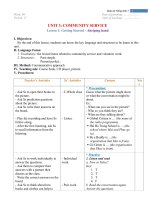Unit 03 community service lesson 1 getting started
Bạn đang xem bản rút gọn của tài liệu. Xem và tải ngay bản đầy đủ của tài liệu tại đây (2.04 MB, 26 trang )
<span class="text_page_counter">Trang 2</span><div class="page_container" data-page="2">
<b>What activities can you see in the clip?</b>
</div><span class="text_page_counter">Trang 4</span><div class="page_container" data-page="4"> community service (n) : phục vụ cộng đồng homeless (adj)
: làm tình nguyện volunteer (v/n )
: vơ gia cư
non-profit organization (n) <sub> : tổ chức phi lợi nhuận</sub> : tình nguyện viên
donate (v) : hiến tặng , đóng góp
to make a difference : Làm thay đổi (cho tốt đẹp)
</div><span class="text_page_counter">Trang 5</span><div class="page_container" data-page="5"><i><b> Fill the gaps with the words in the box.</b></i>
1. She often ________________ money to charitable organisations.
2. You are a _______________ if you help other people willingly and without payment.
3. The activities that individuals or organisations do to benefit a community are called ___________________.
4. If you are trying to ___________________, you are trying to have a good effect on a person or situation.
5. _________________ are those who do not have a home and really need help.
</div><span class="text_page_counter">Trang 6</span><div class="page_container" data-page="6"><b>1. Who are they ?</b>
<b>2. What are they talking about? </b>
</div><span class="text_page_counter">Trang 7</span><div class="page_container" data-page="7"><b>R: Today on Global Citizen we interview Mai and Phuc from Hai Ba Trung School. Hi Mai, Could you tell us about community service?M: It’s the work you do for the benefits of the community.</b>
<b>R: Have you ever done volunteer work?</b>
<b>M: Yes. I’m a member of Be a Buddy - a programme that helps street children. Last year we provided evening classes for fifty children.R: Wonderful! What else have you done?</b>
<b>M: We’ve asked people to donate books and clothes to the children.</b>
<b>R: Wow, that certainly makes a difference. And you Phuc, you’re from Go Green?</b>
<b>P: Yes it’s a non-profit organisation that protects the environment. We’ve encouraged people to recycle glass, cans, and paper. We’ve cleaned streets and lakes.</b>
<b>R: Did you start a community garden project last month?P: Oh, yes, so far we’ve planted…</b>
<b>II Listen and read</b>
</div><span class="text_page_counter">Trang 8</span><div class="page_container" data-page="8"><b>1. Match the phrases with their definitions</b>
</div><span class="text_page_counter">Trang 9</span><div class="page_container" data-page="9"><b>2. Read the conversation again and tick () true (T) or false (F).</b>
<b>T F</b>
<b>1. Mai and Phuc work for the benefits of the community.</b>
<b>2. Be a Buddy has collected books and clothes for street children.</b>
<b>3. Be a Buddy has provided education for street children.</b>
<b>4. Go Green is an environmental business.5. Go Green has encouraged people to </b>
</div><span class="text_page_counter">Trang 10</span><div class="page_container" data-page="10">1. What does the community service mean?Helping the community without payment. <sup>2. What does the phrase </sup>
“ make a difference” mean?<sup>Doing something good.</sup> 3. What does the Go Green do in their community garden project?<sup>It plants trees.</sup> 4. How does the community garden
project do to make a difference”?<sup>5. What does “Be a Buddy” do</sup><sup>protect the environment.</sup>Help the street children.?
</div><span class="text_page_counter">Trang 11</span><div class="page_container" data-page="11"><b>4. Look at the words in the box. Can you put them in the right groups?</b>
<i><b>(Hint: some words may belong to more than one column)</b></i>
<b>clean</b>
</div><span class="text_page_counter">Trang 12</span><div class="page_container" data-page="12"><b>5. Describe the pictures with the verbs in 4.</b>
</div><span class="text_page_counter">Trang 13</span><div class="page_container" data-page="13"><i><b><small>6. Create word webs.</small></b></i>
<b>Donate </b>
</div><span class="text_page_counter">Trang 14</span><div class="page_container" data-page="14"><b>5. Create word webs.</b>
</div><span class="text_page_counter">Trang 15</span><div class="page_container" data-page="15"><b>- Learn new words by heart.- Practice the dialogue again.</b>
<b>- Do exercises B1, B2 (page 18/ workbook).</b>
</div><span class="text_page_counter">Trang 17</span><div class="page_container" data-page="17">5. People who do not have home are called _____ people.
1. People who are not rich are called _____ people.
2. People who do not have the physical or mental abilities that most people have are called _____ people.
4. Old people can also be called _____ people.
6. People who are not in good health are _____ people.
</div><span class="text_page_counter">Trang 18</span><div class="page_container" data-page="18">2. People who do not have the
physical or mental abilities that most people have are called _____ people. 4. Old people can also be called _____ people.
6. People who are not in good health are _____ people.
</div><span class="text_page_counter">Trang 19</span><div class="page_container" data-page="19">2. People who do not have the
physical or mental abilities that most people have are called _____ people. 4. Old people can also be called _____ people.
6. People who are not in good health are _____ people.
</div><span class="text_page_counter">Trang 20</span><div class="page_container" data-page="20">2. People who do not have the
physical or mental abilities that most people have are called _____ people. 4. Old people can also be called _____ people.
6. People who are not in good health are _____ people.
</div><span class="text_page_counter">Trang 21</span><div class="page_container" data-page="21">2. People who do not have the
physical or mental abilities that most people have are called _____ people. 4. Old people can also be called _____ people.
6. People who are not in good health are _____ people.
</div><span class="text_page_counter">Trang 22</span><div class="page_container" data-page="22">2. People who do not have the
physical or mental abilities that most people have are called _____ people. 4. Old people can also be called _____ people.
6. People who are not in good health are _____ people.
</div><span class="text_page_counter">Trang 23</span><div class="page_container" data-page="23">2. People who do not have the
physical or mental abilities that most people have are called _____ people. 4. Old people can also be called _____ people.
6. People who are not in good health are _____ people.
</div><span class="text_page_counter">Trang 24</span><div class="page_container" data-page="24"><b>- Learn new words by heart.- Practice the dialogue again.</b>
<b>- Do exercises B1, B2 (page 18/ workbook).</b>
</div><span class="text_page_counter">Trang 26</span><div class="page_container" data-page="26"><b>1.You are a _______________ if you help other people willingly and without payment.</b>
<b>3.She often _________ money to charitable organisations.</b>
<b>4.The activities that individuals or organisations do to benefit a community are called _________________.</b>
<b>5.If you are trying to ________________, you are trying to have a good effect on a person or situation. </b>









